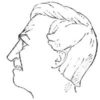I analyze what I did wrong in the situation for the next time it happens. That is not helpful, as the error cannot show us the correct way of doing a thing. This is perhaps one of the biggest logic errors most people commit, but without reflection we can’t help it. The instinct takes over.
The core instinct that makes wrongs register so lastingly in our minds is very narrow in it’s range of responses. So when we act on this vigilance, it gives us only the choice of destruction or avoidance. It’s not really capable of more elaborate thought on its own.
Flight or fight? Yes, and it’s influence becomes viral. In today’s complex world, many things can trigger this instinct that have nothing to do with physical threats and can’t be answered effectively by fight or flight.
Example. They have done studies on the recently estranged. Those recently divorced from their partners or dumped by their significant others. fMRI shows that the brain uses the same circuits to recognize this state as it does to register physical injury. What this means is your emotional habits refresh and preserve physically stressful and injurious states even long after the event itself has passed, and they narrow both your perception of similar situations when they occur as well as your comprehension of anything even vaguely related.
If you live in your head, it can be like opening up wounds constantly if you aren’t careful. Indeed.
Hence we acquire those ‘trigger’ points? Yes. This is why people can supposedly push your buttons, and by this your free will is not helped but compromised. What path forward is there in holding to these memories or feelings?
But what about situations where an immediate action can stop the event from happening? Should we just let it happen over and over again? You should reflect on why it is a recurrent pattern in your environment, but the immediate action may reinforce the cycle rather than break it.
It sounds like we’re held in a repetitive fight or flight response to these events that we feel wronged us, so we need to find a third point? Indeed. There is one element that remains persistent between all mental states. It’s even capable of retraining the low level fight or flight based awareness. The observer or monitor. The third eye, if you will.
The default state of the mind is simple awareness. It serves as the center or homeostatic point. When we retain our orientation on center, no state of mind becomes anything other than a choice. We believe, mostly based on how we were taught, that we can learn from our mistakes, but this is not actually correct. It is a half truth only.
Still the mind, reaction drops and a new insight arises. Count to 10? If that works for you, yes. For most, that is more agitating. We learn better when we realize we are mistaken.
Take a deep breath. Take a deep breath is always good advice.
I find it calms me. It triggers a stabilizing reflex. Your nervous system responds to a shift out of the shallow breathing by making you relax. We breath shallowly when we are ready for fighting or fleeing.
Martial arts focuses on breathing. Yes, and teaches to keep regular breathing at all times.
It’s like going into meditation. It focuses the mind. Just being aware of and steadying the breath is a meditation in itself. It doesn’t take anything more complicated than that.
Your thoughts are welcome. Be well friends.
Travis Saunders
Dragon Intuitive
~science,mysticism,spirituality~



Leave a Reply